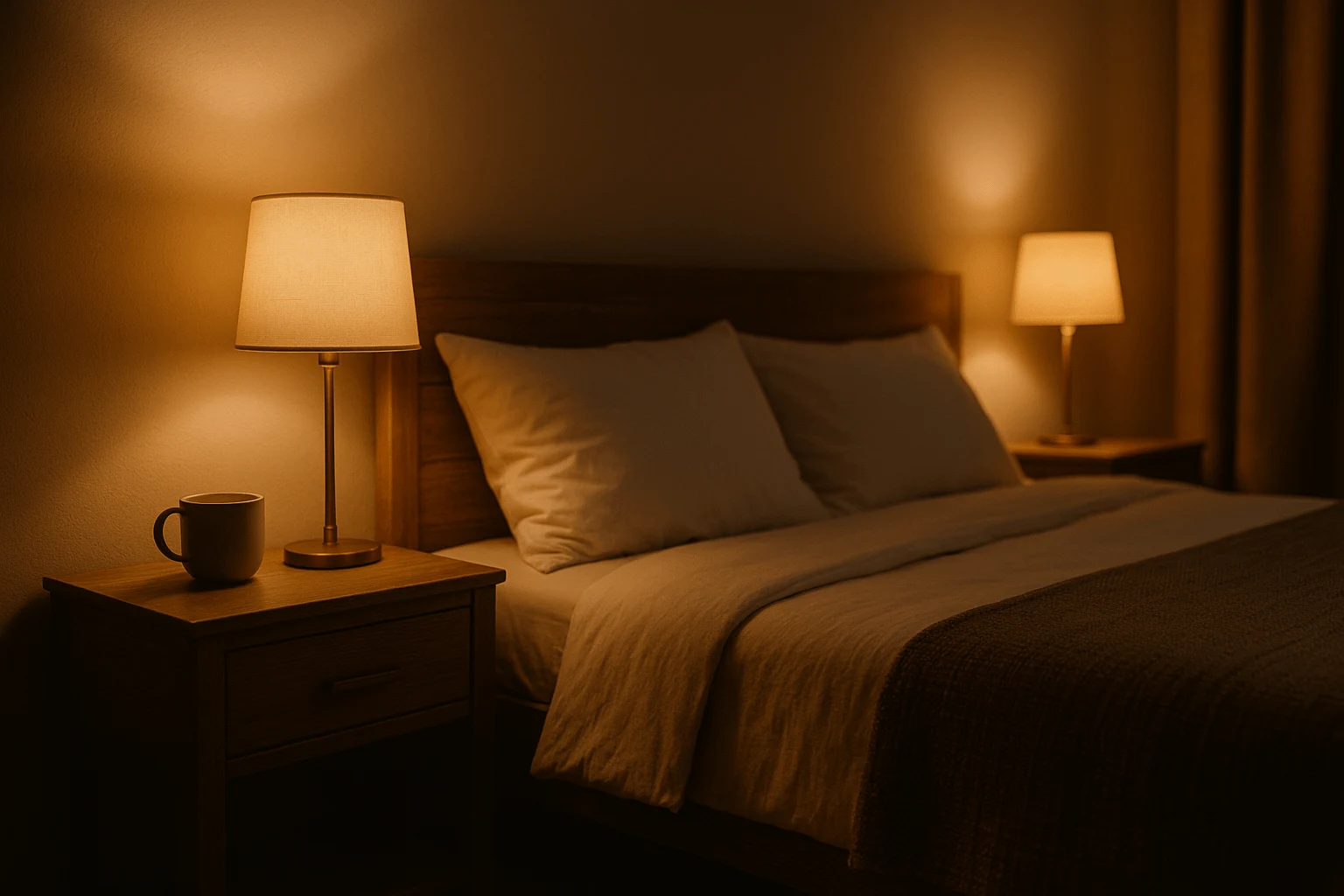Tried melatonin, magnesium, or white noise—but still can’t sleep?
You’re not alone.
Many of us reach for quick fixes when sleep gets tough. And sometimes those tools help—at least for a little while. But when your nights feel off more often than not, and you’re waking up just as tired as when you went to bed, it might be time to go deeper.
That’s where sleep hygiene comes in.
It’s not a trend or a strict routine. It’s simply the way your daily habits and environment either support—or sabotage—your sleep. And more often than not, the smallest tweaks make the biggest difference.
If you’ve never tried adjusting your environment or routine before bed, these simple sleep hygiene tips are a great place to start.
They’re not about being perfect. They’re about giving your brain and body what they need to feel safe, calm, and ready to rest.
So if you’ve been wondering why you still feel wired at night or groggy in the morning, these eight small shifts could be the reset your sleep has been needing.
What Is Sleep Hygiene?
Sleep hygiene might sound clinical, but at its core, it’s really just about creating a rhythm that helps your body feel safe enough to rest.
It’s the combination of your evening habits, your sleep environment, and the signals you send your brain as bedtime approaches.
When these signals are consistent, your body starts to learn: “Okay, it’s time to wind down now.” But when your routine changes every night—or your bedroom is full of distractions—it can confuse your internal clock and make falling asleep harder than it needs to be.
That’s why sleep hygiene is often one of the first things sleep coaches and therapists look at. It’s not about perfection. It’s about setting the stage so your body can do what it’s naturally built to do: sleep deeply and wake feeling more like yourself.
If you’ve been trying to sleep better naturally, and nothing seems to be working, improving your sleep hygiene might be the most gentle and effective place to begin.
And the best part?
You don’t need a big overhaul. Just a few thoughtful changes—like dimming the lights earlier or adjusting your bedtime—can make a noticeable difference.
8 Simple Sleep Hygiene Tips That Make a Big Difference
You don’t need to overhaul your entire routine to start sleeping better. Often, it’s the quiet, overlooked habits—like how you wind down, what your room feels like, or when you wake—that shape the quality of your rest.
These sleep hygiene tips are small but powerful. They’re designed to gently support your body’s natural rhythm without adding stress or strict rules.
Let’s take a look at eight ways to bring more ease and consistency into your nights—starting tonight.
1: Stick to a Consistent Sleep Schedule?
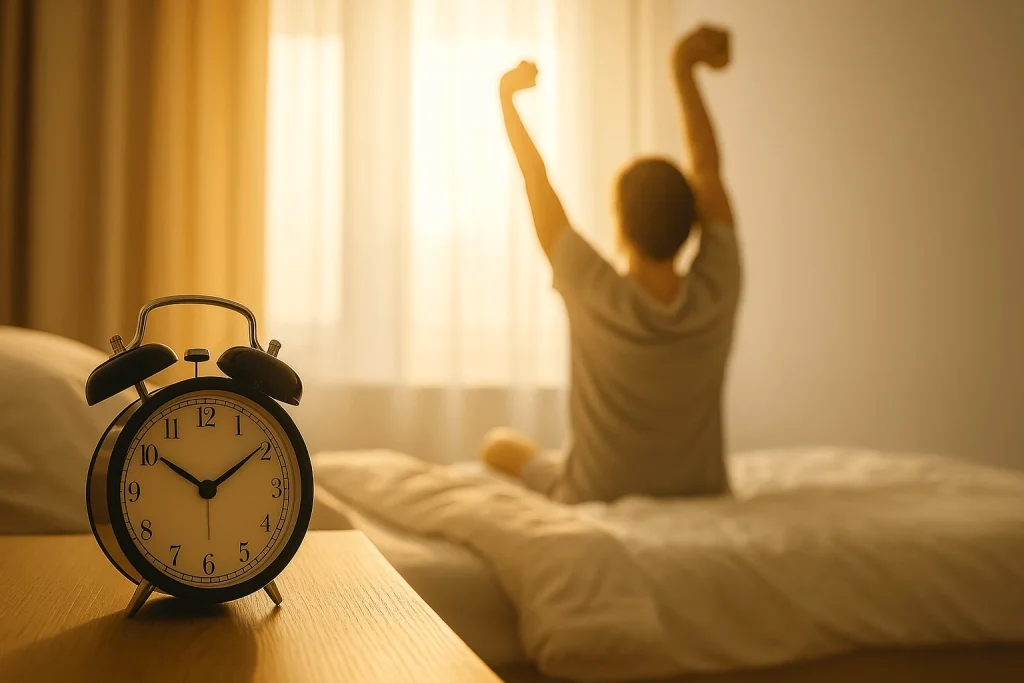
f there’s one habit that quietly supports everything else, it’s this.
Our bodies thrive on rhythm—especially when it comes to sleep. Going to bed and waking up at roughly the same time each day helps your internal clock (your circadian rhythm) stay in sync. And when that clock is steady, falling asleep becomes easier, and waking up feels more natural.
But if your sleep and wake times shift from day to day—late nights here, early alarms there—it can leave your body feeling confused and out of step. Even if you’re “in bed” for eight hours, your sleep may feel lighter or more disrupted.
To improve your sleep hygiene, try anchoring your wake-up time first. Pick a time that works for your current lifestyle and stick with it—yes, even on weekends if you can. Once your mornings are consistent, your bedtime will often start to fall into place on its own.
2. Make Your Bedroom a Sleep-Only Zone
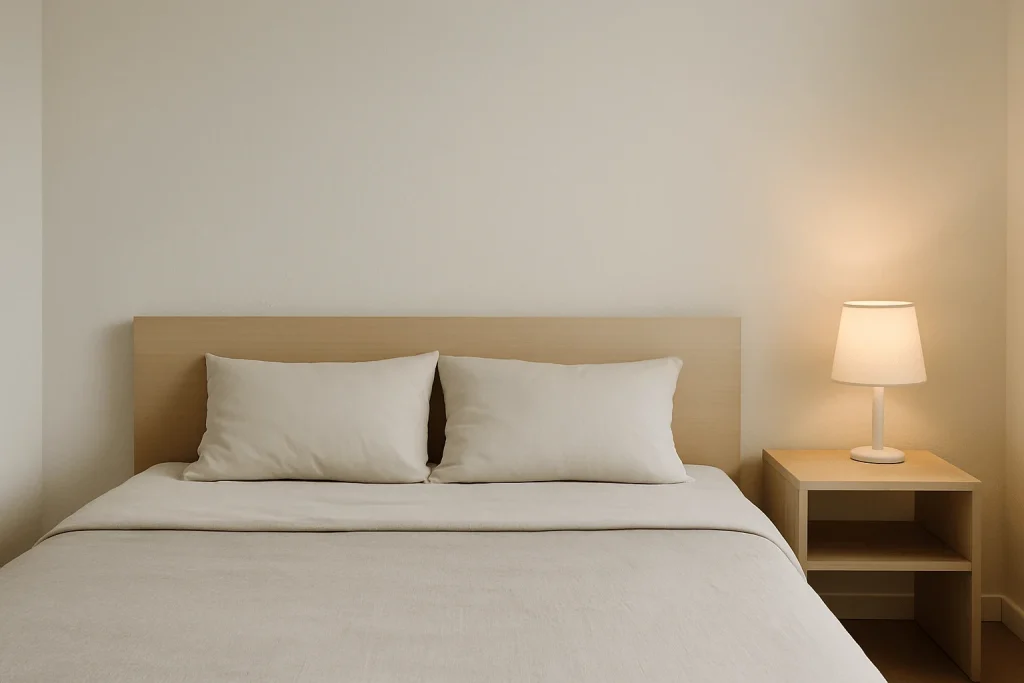
It’s hard to relax when your brain associates your bed with things like emails, Netflix, or scrolling through the news.
One of the simplest but most overlooked sleep hygiene techniques is training your brain to see your bedroom as a place for just two things: sleep and rest. When your bed becomes a cue for winding down—rather than working, worrying, or multitasking—your body starts to respond more quickly when you crawl under the covers.
If possible, try to move stimulating activities (like work, phone use, or TV) out of your bedroom altogether. Even dimming lights or clearing clutter from your nightstand can send a subtle message: this is a calm, safe space to rest.
3. Dim the Lights and Power Down Devices Before Bed
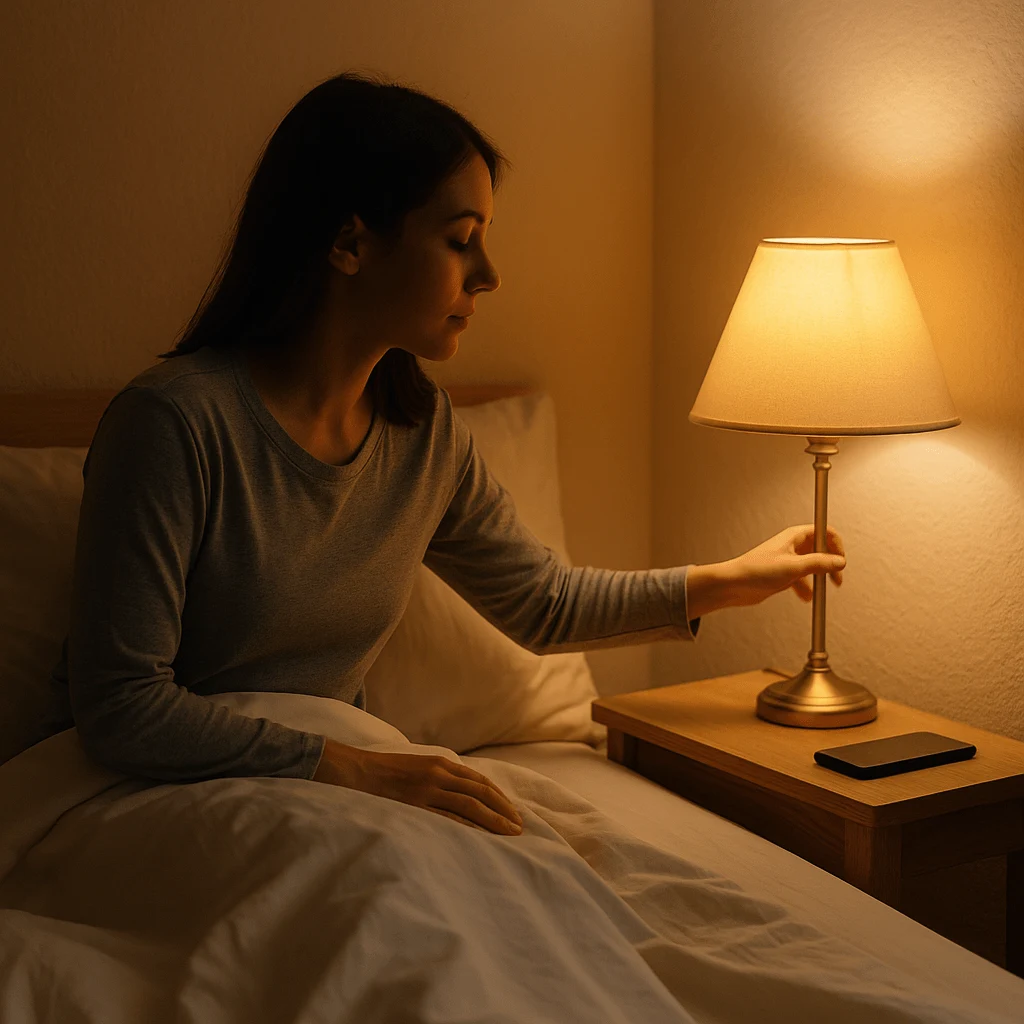
Your body takes cues from light—especially the bright, artificial kind that comes from overhead bulbs, TVs, and phone screens.
In the evening, too much light tells your brain to stay alert. It holds off on producing melatonin, the hormone that helps you feel drowsy and ready for bed. That’s why light—especially blue light—can quietly disrupt even the best sleep hygiene routine.
To support your sleep rhythm, try dimming the lights about an hour before bedtime. Switch to lamps, warm bulbs, or even candlelight if that feels soothing. And aim to power down screens at least 30–60 minutes before sleep.
If you need to keep using a device, turning on night mode or using blue light filters can help soften the impact.
4. Keep Your Room Cool and Comfortable
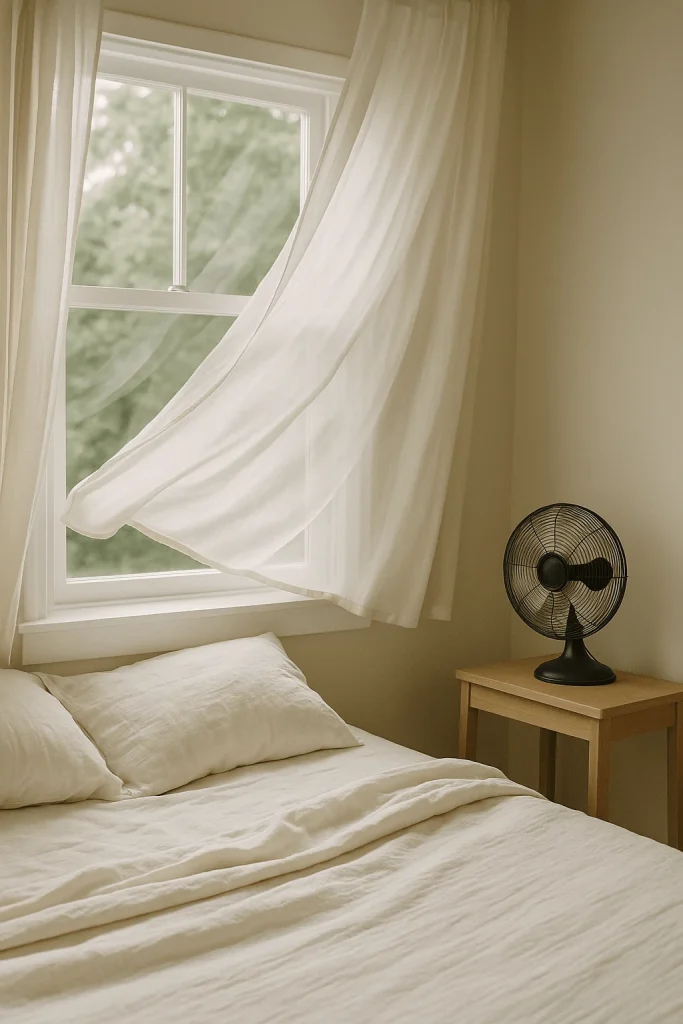
Your body naturally cools down as it gets ready for sleep. A warm room can interrupt that process, making it harder to drift off—or stay asleep through the night.
That’s why temperature plays a bigger role than most people realize. A room that’s too hot or stuffy can lead to tossing, turning, or waking up feeling unrested, even if you were “asleep” the whole time.
The ideal bedroom temperature for most people falls between 60 and 67°F (16–19°C). But it’s not just the thermostat—bedding matters too. Try using breathable fabrics like cotton or linen, and consider layering blankets so you can adjust easily through the night.
Small touches like a fan, blackout curtains, or even a warm (but not hot) shower 60–90 minutes before bed can help your body ease into sleep more naturally.
5. Avoid Stimulants Like Caffeine and Nicotine After 2 PM

Even if you don’t feel wired after your afternoon coffee, the effects of caffeine linger quietly in your system for hours.
Caffeine blocks the buildup of adenosine—a chemical that helps your brain feel sleepy. That means even a small amount in the afternoon or evening can delay sleep or make it feel lighter than usual. Nicotine has similar effects, acting as a stimulant that can keep your body in a more alert state when it should be winding down.
To support deeper rest, try cutting off caffeine and nicotine at least six hours before bed. That usually means no coffee, black tea, soda, energy drinks, or smoking after 2 p.m.
If you want something warm in the evening, herbal teas like chamomile, rooibos, or lemon balm are gentler options. Even a simple cup of warm water with a slice of ginger or turmeric can feel comforting without interfering with your sleep.
Related : 7 Best Herbal Teas for Sleep and Anxiety Relief
6. Establish a Calming Pre-Bedtime Routine
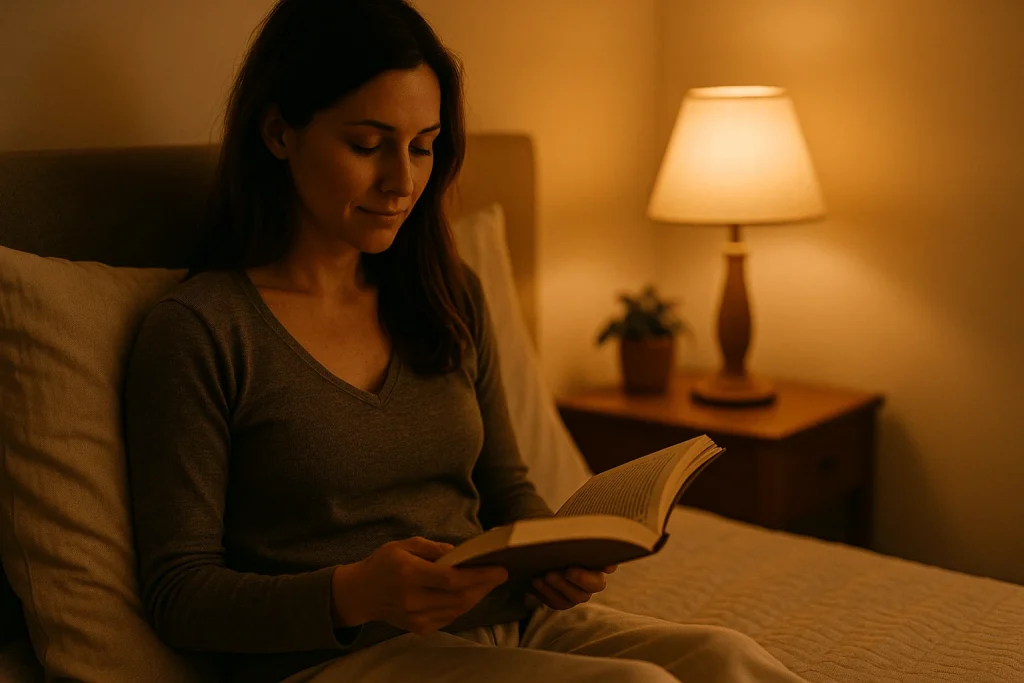
What you do in the hour before bed sets the tone for your sleep—whether you realize it or not.
If your evenings are packed with stimulation (emails, TV, to-do lists), your body might still be in “go mode” even when your head hits the pillow. A calming sleep hygiene routine helps signal that the day is winding down and it’s safe to rest.
This doesn’t have to be complicated. Choose 2–3 quiet activities that help you shift gears. That could be reading a book, doing some light stretching, journaling, dimming the lights, or listening to calming music.
Over time, repeating these same cues each night helps your brain recognize: It’s time to slow down.
Related Posts:
- 5 Proven Mental Exercises for Sleep That Actually Work
- 7 Powerful Breathing Exercises for Better Sleep You Can Try Tonight
7. Get Morning Sunlight Exposure to Reset Your Body Clock

One of the most powerful ways to support healthy sleep doesn’t happen at night—it happens in the morning.
Your internal clock, or circadian rhythm, takes its biggest cues from natural light. When you expose your eyes to sunlight early in the day, it helps reset that rhythm and reinforces a clear sleep-wake cycle.
The result? You feel more alert in the morning and naturally sleepier when evening comes.
Try stepping outside within an hour or two of waking—even if it’s just for a few minutes. A walk, coffee on the porch, or sitting near a bright window can all help. Aim for 15–30 minutes of natural light if you can.
On cloudy days or during winter, opening curtains wide or using a light therapy box can be a helpful backup.
8. Finish Meals at Least 2–3 Hours Before Bed
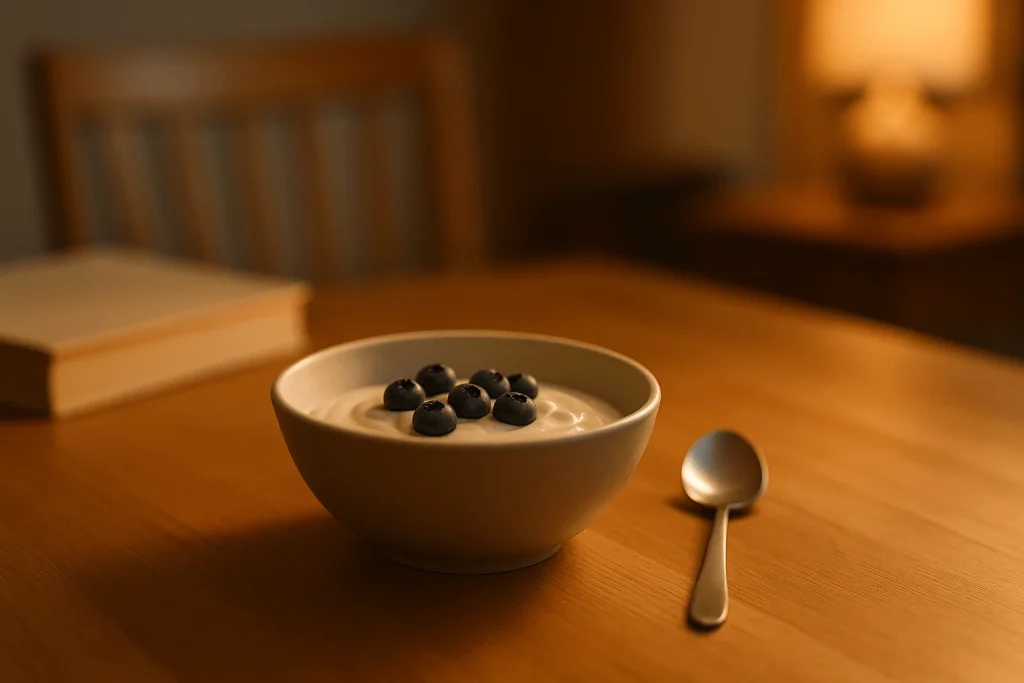
Eating too close to bedtime can make it harder for your body to fully relax. While you’re trying to sleep, your system is still busy digesting—especially if the meal was heavy, spicy, or high in sugar.
This can lead to bloating, heartburn, or a general sense of restlessness that pulls you out of deeper stages of sleep.
To give your body time to shift into rest mode, aim to finish dinner at least 2–3 hours before you head to bed. If you find yourself a little hungry later in the evening, a small, balanced snack can be okay—something light like a banana with almond butter, a handful of nuts, or a warm herbal tea with oat milk.
The goal isn’t to go to bed hungry—it’s to avoid giving your digestive system extra work right when it’s trying to wind down.
Related: 10 Sleep-Friendly Snacks to Enjoy Before Bed
How Long Does It Take to Improve Sleep Hygiene?
When you start making changes to your sleep routine, it’s natural to wonder how long it’ll take before you feel a difference.
For some people, even one or two shifts—like waking up at the same time or dimming lights earlier—can bring quick relief. For others, it may take a little longer for the body to unlearn old patterns and settle into new rhythms.
On average, it takes about 1 to 2 weeks of consistent habits for most people to notice meaningful changes in how easily they fall asleep or how refreshed they feel in the morning.
You don’t have to change everything at once. Start with one or two areas that feel doable. Then give your body some time to respond.
If you want to track your progress, jot down a few notes in a sleep journal or use a simple app—just to observe how things shift over time. Sometimes progress feels subtle before it becomes obvious.
Download This Free Printable Sleep Tracker
Bottom Line: Better Sleep Starts with Better Habits
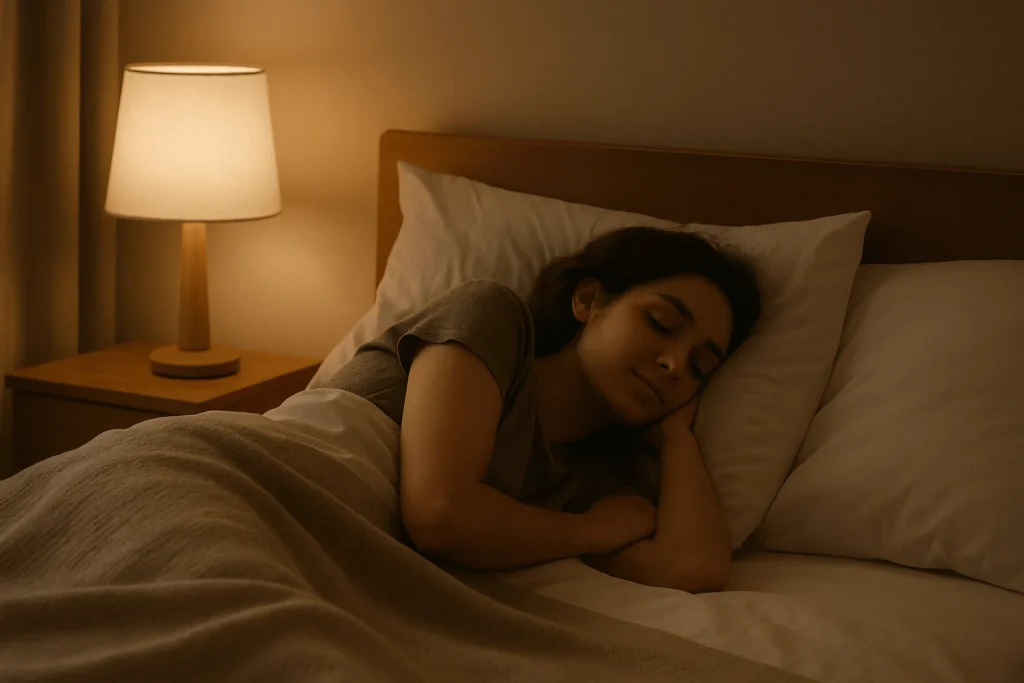
If your sleep has been feeling off lately, it doesn’t mean something is wrong with you. Sometimes, it’s just your body asking for a little more consistency and care.
These simple sleep hygiene tips aren’t meant to be overwhelming—they’re gentle tools you can return to again and again.
You don’t need to fix everything all at once.
Start with one small shift tonight, and build from there. Even something as simple as dimming the lights earlier or keeping your wake-up time steady can create a ripple effect over time.
The more you support your body’s natural rhythms, the more easily sleep tends to follow.
Want to stay on track?
Download our free printable Sleep Hygiene Checklist to keep these habits front and center in your evening routine.
FAQ:
1. What is the meaning of sleep hygiene?
Sleep hygiene refers to the daily habits and environmental factors that support healthy, restful sleep. This includes your bedtime routine, sleep schedule, bedroom setup, and how you wind down in the evening.
2. What is the best sleep hygiene?
The best sleep hygiene includes keeping a consistent sleep schedule, creating a calm bedroom environment, limiting screen time before bed, and establishing a relaxing bedtime routine. These habits work together to support your body’s natural sleep rhythm.
3. What is poor sleep hygiene?
Poor sleep hygiene includes habits that interfere with quality sleep—like going to bed at different times each night, using electronics in bed, consuming caffeine late in the day, or sleeping in a noisy, cluttered space.
4. Do and don’ts of sleep hygiene?
Do: Go to bed and wake up at the same time daily, dim the lights before bed, and create a relaxing wind-down routine.
Don’t: Use your phone in bed, drink caffeine late in the day, or bring work into the bedroom.
5. What habits ruin sleep hygiene?
Inconsistent sleep and wake times, eating large meals late at night, overstimulating screen time before bed, and keeping your bedroom too bright or hot are all habits that can negatively impact your sleep hygiene.
6. What should we not do while we sleep?
During sleep, avoid actions that disrupt rest—like keeping your phone nearby with alerts on, falling asleep with the TV on, or wearing tight, uncomfortable clothing. Good sleep hygiene means protecting your sleep environment from avoidable disruptions.

